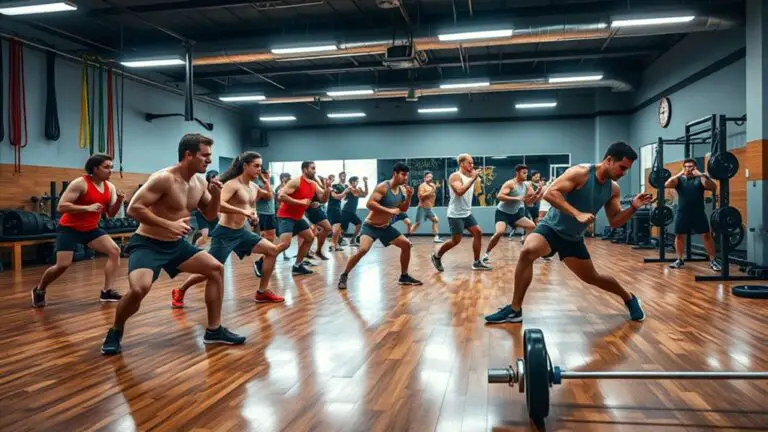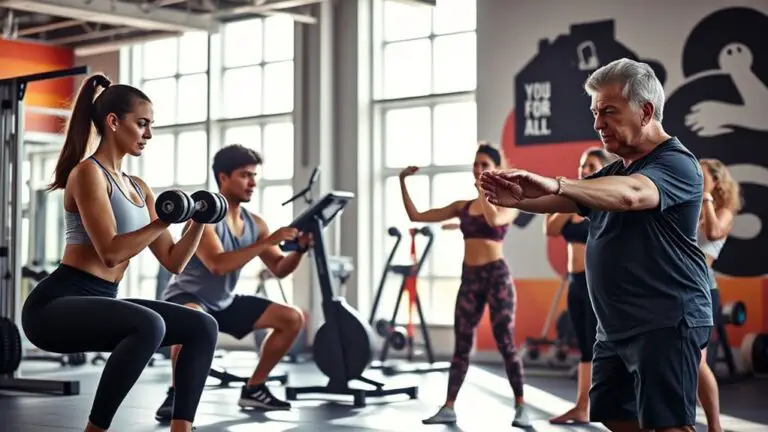How to Avoid Fungal Infections From Gym Showers
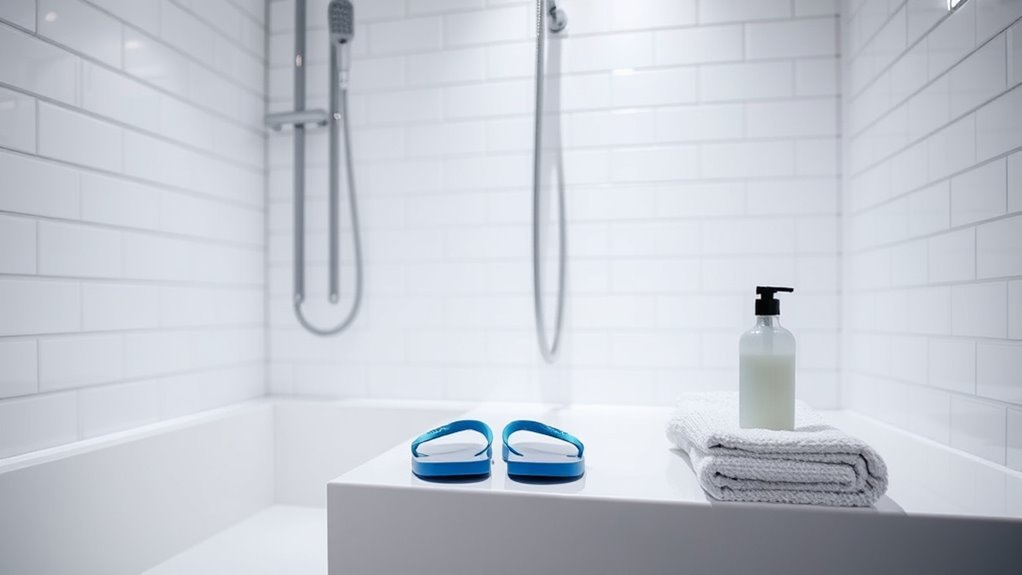
To avoid fungal infections from gym showers, always wear flip-flops to minimize direct contact with the floor. Keep your feet dry and moisture-free by drying them thoroughly after showering. Limit your shower time and use mild soap to prevent irritation. Invest in antifungal powders for added protection and never share personal items like towels or shoes. Finally, check for cleanliness in the shower area. There’s more you can do to enhance your protection.
Understanding Fungal Infections in Gym Showers
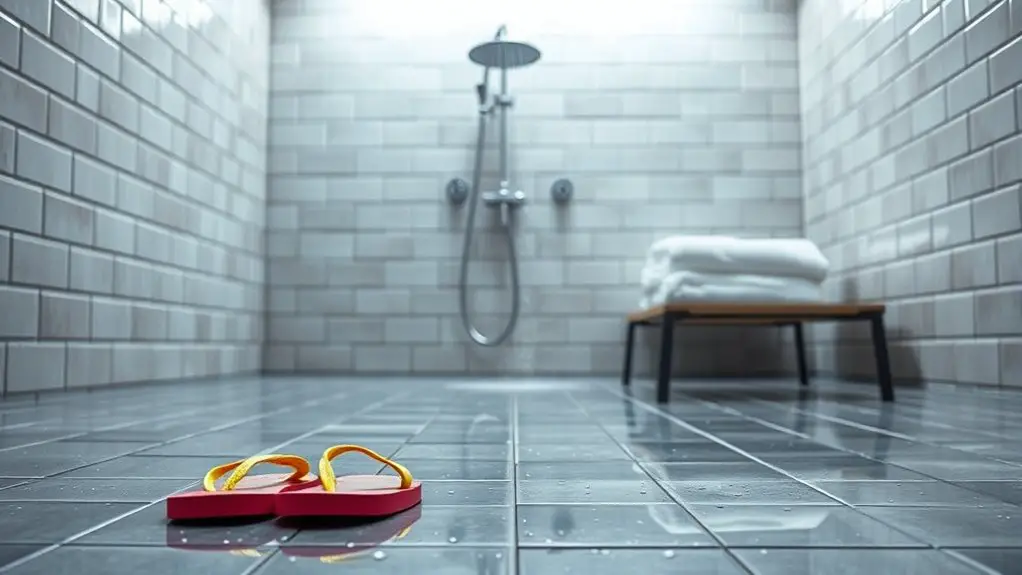
When you step into a gym shower, you might not think much about the environment, but it can be a breeding ground for fungal infections. Fungi thrive in warm, damp areas, making gym showers particularly susceptible to fungal transmission. If the facilities aren’t maintained properly, the risk of infection increases considerably.
To protect yourself, it’s essential to assess gym cleanliness. Look for signs of mold or mildew, and check if the showers are regularly cleaned and sanitized. Always wear flip-flops or waterproof sandals to minimize direct contact with the shower floor.
Additionally, avoid sharing personal items like towels or razors, as these can also harbor fungi. By being mindful of your surroundings and taking simple precautions, you can considerably reduce your risk of developing a fungal infection in the gym shower. Remember, staying informed and vigilant is key to your health and wellness.
The Importance of Proper Hygiene Practices
Maintaining proper hygiene practices is essential not just for your personal health, but also for preventing the spread of infections in communal spaces like gyms. By adopting good hygiene habits, you protect yourself and others from harmful fungi. Regular showers, using your own towels, and keeping your personal care items separate can make a huge difference.
| Hygiene Habit | Benefits | Consequences of Neglect |
|---|---|---|
| Shower after workouts | Removes sweat and bacteria | Increased risk of infection |
| Use flip-flops in showers | Protects feet from germs | Direct contact with fungi |
| Dry feet thoroughly | Prevents moisture buildup | Fungal growth and irritation |
Choosing the Right Footwear
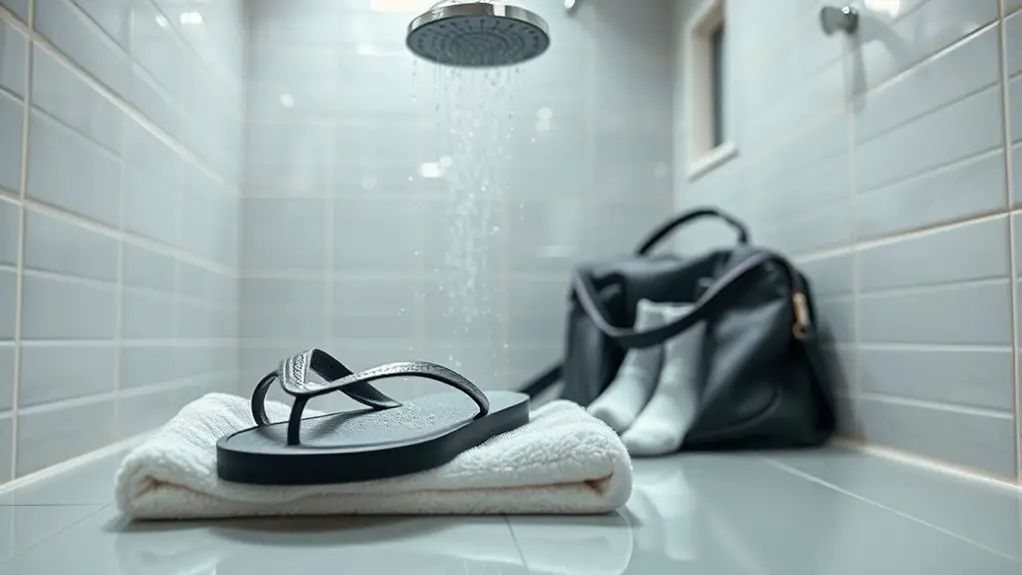
When it comes to preventing fungal infections, choosing the right footwear is essential. Look for shoes made of breathable materials to keep your feet dry and comfortable. Don’t forget to select non-slip soles for safety and replace your footwear regularly to maintain ideal foot health.
Opt for Breathable Materials
Choosing the right footwear is essential in preventing fungal infections, especially since damp and warm environments can promote fungal growth. Opt for shoes made from breathable fabrics, like mesh or canvas, which help keep your feet dry and reduce moisture buildup. This moisture control is important, as fungi thrive in wet conditions. Look for styles that allow for airflow, ensuring that your feet don’t get overheated during workouts. Additionally, consider sandals or flip-flops when using communal showers, as they further enhance ventilation. Remember, good footwear not only supports your activities but also plays a key role in maintaining foot health. By choosing breathable materials, you can greatly lower your risk of fungal infections and keep your feet feeling fresh.
Select Non-Slip Soles
How can you guarantee your safety while traversing slippery surfaces? Selecting footwear with non-slip designs is essential. Look for shoes specifically made for wet environments, as they often come with enhanced safety features like textured soles that grip the floor. These designs help you maintain balance and prevent slips in gym showers, where moisture can create hazardous conditions.
When choosing your shoes, consider options with rubber soles, which provide excellent traction. Additionally, make sure they fit well to avoid any mishaps while you’re on the move. By prioritizing non-slip footwear, you not only enhance your safety but also reduce the risk of fungal infections that thrive in damp environments. So, choose wisely and step confidently into your gym routine!
Regularly Replace Footwear
Maintaining the right footwear goes beyond just selecting non-slip designs; it also means regularly replacing your shoes. Over time, shoes wear down, losing their effectiveness in protecting your feet from fungal infections lurking in gym showers. To guarantee footwear longevity and safeguard your health, keep an eye on these signs that it’s time for timely replacements:
- Worn-out soles: If your shoe treads are smooth, they won’t grip wet surfaces effectively.
- Unpleasant odors: Persistent smells can indicate bacteria and fungi are thriving in your shoes.
- Visible damage: Cracks or tears can allow moisture and pathogens to seep in.
Always Use a Shower Mat
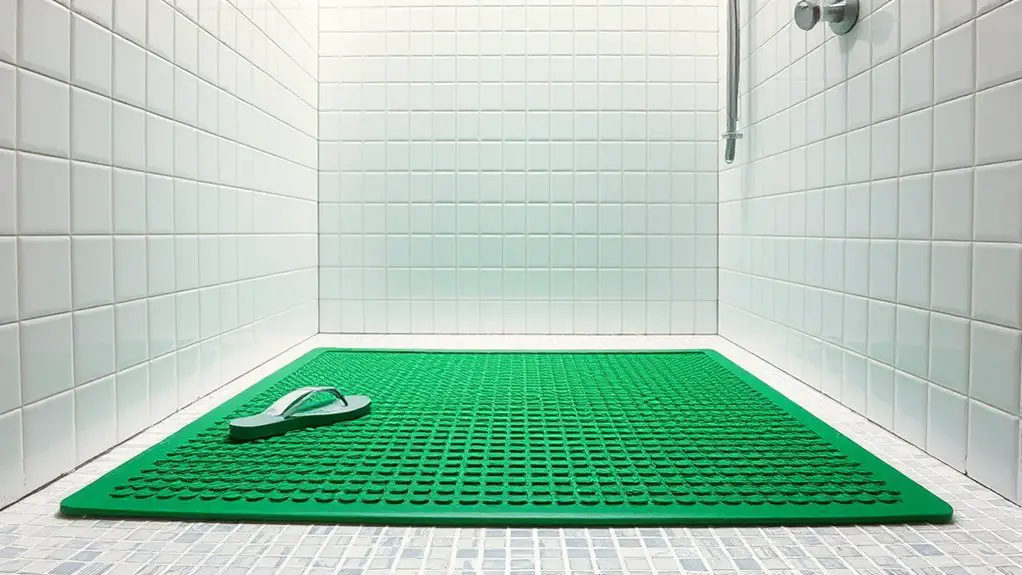
Using a shower mat is essential for maintaining hygiene in your bathroom. It can help absorb excess water and prevent the growth of fungi, especially in damp areas. When choosing a mat, opt for materials that are quick-drying and resistant to mold to keep your space safe and clean.
Importance of Hygiene
A clean and dry environment is essential for preventing fungal infections, and one simple way to achieve that is by always using a shower mat. By prioritizing hygiene, you’re not just protecting yourself; you’re also contributing to overall gym cleanliness.
Here are some reasons why maintaining hygiene is vital:
- Reduces moisture: Shower mats absorb excess water, keeping the floor dry and less hospitable for fungi.
- Encourages personal hygiene: Using a mat reminds you to be mindful of your surroundings and personal cleanliness post-workout.
- Promotes a healthy atmosphere: A clean mat signifies a commitment to health, making the gym a safer space for everyone.
Choosing the Right Material
When it comes to preventing fungal infections, selecting the right material for your shower mat can make a significant difference. You’ll want a mat that’s both durable and moisture-resistant to keep those pesky fungi at bay. Look for materials like rubber or PVC, as they provide excellent durability and are easy to clean.
Here’s a quick comparison to help you decide:
| Material | Moisture Resistance |
|---|---|
| Rubber | High |
| PVC | High |
| Cotton | Moderate |
| Foam | Low |
Choosing the right shower mat not only enhances safety but also minimizes the risk of infections. Invest in a quality mat, and you’ll enjoy a cleaner, healthier shower experience.
Keep Your Feet Dry and Moisture-Free
To prevent fungal infections, keeping your feet dry and moisture-free is essential. Fungi thrive in damp environments, so practicing good moisture control is crucial for effective foot care. Here are some tips to help you maintain dryness:
Keeping your feet dry is vital to prevent fungal infections, as fungi flourish in damp conditions.
- Choose breathable footwear: Opt for shoes made of materials that allow air circulation, reducing sweat accumulation.
- Use moisture-wicking socks: Select socks that draw moisture away from your feet, keeping them dry during workouts.
- Dry your feet thoroughly: After showering or exercising, make sure to dry your feet completely, especially between the toes.
Use Antifungal Powder or Spray
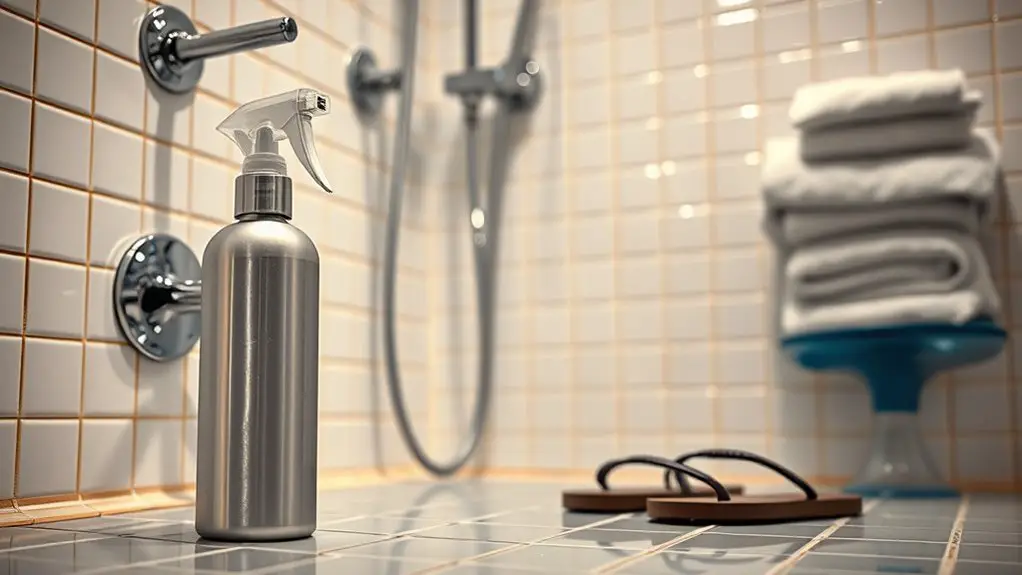
Using antifungal powder or spray can be an effective way to prevent infections, especially in warm, damp areas of your body. You’ll want to guarantee you’re applying it correctly for maximum protection, so knowing the best techniques is key. Plus, we’ll cover some of the top products available to keep you safe and comfortable.
Application Techniques
While maintaining proper hygiene is essential in preventing fungal infections, applying antifungal powder or spray effectively can provide an additional layer of protection. When you’re using these products, consider these application methods to guarantee you’re practicing safe practices:
- Clean and dry: Always apply the powder or spray to clean, dry skin to maximize its effectiveness.
- Targeted areas: Focus on areas prone to moisture, like between toes, underarms, and groin.
- Even distribution: Confirm a thin, even layer for best coverage and protection.
Best Products Available
Choosing the right antifungal powder or spray can make a notable difference in preventing fungal infections, especially if you’re active or live in a humid environment. Look for products that contain ingredients like miconazole or clotrimazole, as these are some of the best antifungal creams available. You’ll want something that dries quickly and offers long-lasting protection.
Additionally, don’t overlook the importance of effective shower mats. These mats can help prevent slipping and absorb moisture, reducing the likelihood of fungal growth. By combining antifungal treatments with proper hygiene and protective gear, you’ll notably lower your risk of developing infections. Remember, prevention is key, so make these products a part of your shower routine!
Take Quick Showers
Taking quick showers is an effective way to reduce your risk of fungal infections. By limiting your shower duration, you minimize the time your skin is exposed to moisture, which fungi thrive on. Aim for showers that last no longer than 5-10 minutes. Additionally, keep the water temperature warm but not too hot; hot water can strip your skin of natural oils, leading to dryness and irritation.
Consider these tips for an effective quick shower:
- Rinse off sweat: Remove any sweat and dirt promptly to prevent bacteria growth.
- Use mild soap: Choose a gentle cleanser to avoid irritating your skin.
- Dry off thoroughly: After your shower, make sure to dry your body completely, especially in hidden areas.
Avoid Sharing Personal Items
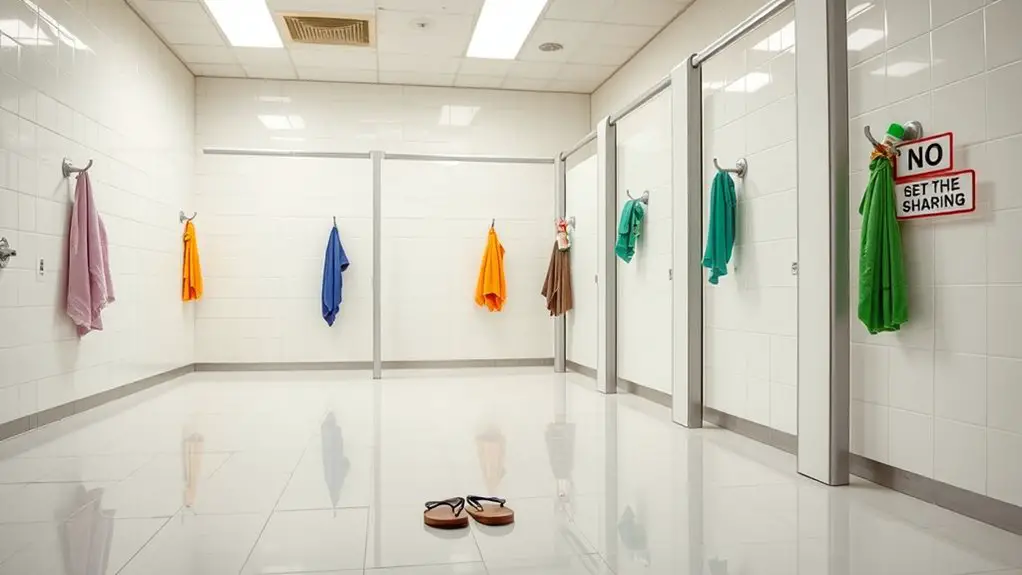
To reduce your risk of fungal infections, it’s important to avoid sharing personal items like towels, shoes, and grooming tools. Sharing these items increases the chances of transferring fungi, which thrive in moist environments like gym showers. Practicing good personal item hygiene is essential for your health.
Here’s a quick comparison of common personal items and their sharing risks:
| Personal Item | Sharing Risks |
|---|---|
| Towels | Can harbor bacteria and fungi |
| Shoes | Can transmit athlete’s foot |
| Razors | Risk of cuts and infections |
| Hairbrushes | Can spread scalp infections |
Inspect Showers for Cleanliness
While you might not always think about it, inspecting showers for cleanliness is an essential step in preventing fungal infections. Before you step into that gym shower, take a moment to perform a quick shower inspection. This can save you from potential discomfort down the line. Here’s what to look for:
- Mold or Mildew: Check for any dark spots or a musty smell; these are signs of an unclean environment.
- Soap Scum or Residue: A buildup of soap can harbor bacteria and fungi.
- Floor Condition: Verify the floor is dry and free from any slippery substances that could indicate water pooling.
Recognizing Symptoms of Fungal Infections
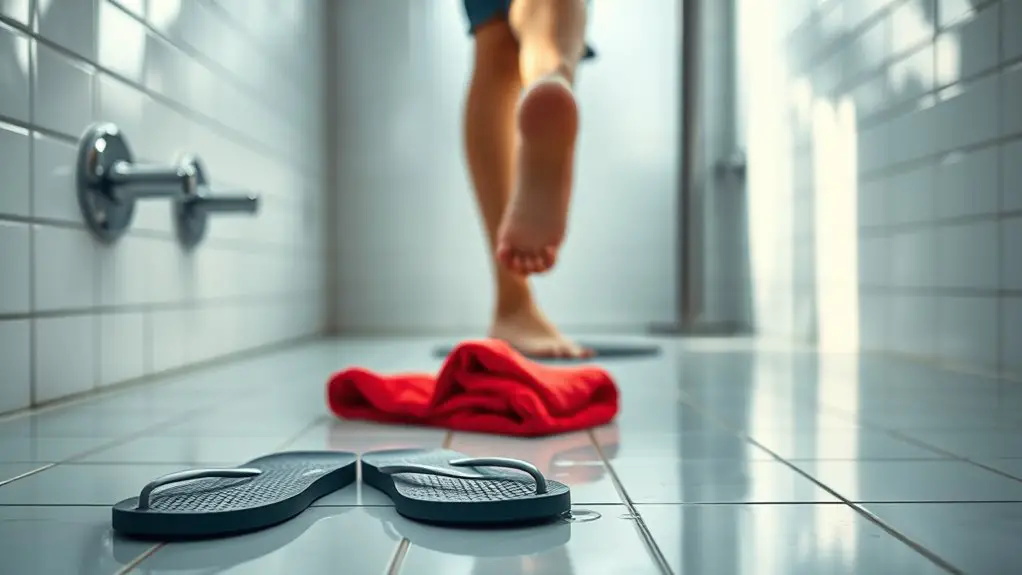
After confirming your shower is clean, it’s important to be aware of the signs that may indicate a fungal infection. One of the most common symptoms is an itchy rash, which can appear on your feet, groin, or other areas that are prone to moisture. If you notice any red, irritated skin that feels uncomfortable, it could be a sign of a fungal issue.
Another symptom to look out for is nail discoloration. If your toenails or fingernails become yellow, white, or brown, or if they start to thicken or crumble, it might indicate a fungal infection is at play. Pay attention to these changes, as catching a fungal infection early can make treatment much easier. Always consult a healthcare professional if you’re uncertain about your symptoms to confirm you receive the appropriate care. Stay vigilant, and you can help keep those pesky infections at bay!
Frequently Asked Questions
Can Diet Influence My Susceptibility to Fungal Infections?
You’d be surprised how much your diet influences your susceptibility to fungal infections. Nutrient-rich foods can boost your immune function, while poor dietary choices may weaken it, making you more vulnerable to infections.
Are Certain Gym Environments Riskier for Fungal Infections?
Certain gym environments can be riskier for fungal infections, especially if locker room cleanliness is lacking. By prioritizing shower hygiene practices, you can greatly reduce your chances of encountering these harmful fungi during workouts.
How Often Should I Clean My Gym Shoes?
Think of your gym shoes as your trusty steed; regular shoe maintenance is key. Clean ’em every few weeks for odor control and to keep them in top shape, ensuring they’re always ready for your next workout.
What Are the Long-Term Effects of Untreated Fungal Infections?
Untreated fungal infections can lead to chronic pain and significant skin damage over time. If you ignore symptoms, you risk complications like spreading the infection, which may require more aggressive treatment later on. Stay vigilant!
Can I Use Essential Oils to Prevent Fungal Infections?
Yes, you can use essential oils to prevent fungal infections. Their natural antifungal properties can help keep you protected. Essential oil benefits include boosting your immune system and promoting healthier skin, making them a great preventive measure.


